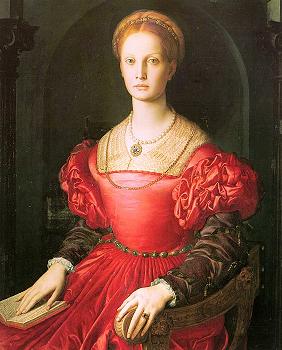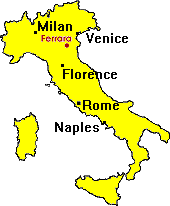
Portrait of Lucrezia Panciatichi, 1540
Click on the picture to see a larger version
 Portrait of Lucrezia Panciatichi, 1540 Click on the picture to see a larger version |
Browning has invented the portrait in order to focus Ferrara's story, so I can't show
you the actual picture because it doesn't exist. I can, however, show you a similar one.
To the right is a portrait of another Lucrezia, painted by the artist known as "Bronzino"
in 1540, about twenty years before the Duchess of Ferrara's mysterious death.
Notice
how elegant and self-possessed this young lady is, wearing such a heavy weight of silk
and pearls, and don't miss the open book that she so casually holds open on her knee.
Ladies of the Italian Renaissance were well-educated and relatively powerful, and were
expected to show a degree of control over their actions and thoughts that would have
been unnecessary in a society that placed less value on women's opinions. To read more
about women in the Renaissance, see the Swiss historian Jakob Burckhardt's chapter on The Equality of Men
and Women in his book,
The Civilization of the Renaissance in Italy. This book was not published
until 1860, eighteen years after "My Last Duchess," but since ideas seldom occur in
isolation Burckhardt is, to a certain extent, reflecting views current in scholarship
in Browning's time.
Ferrara is located in northern Italy, near
Milan and Venice--two wealthy and powerful competing city-states that were, and still
are, well known for their sophistication and love of the arts. Thus, it is not surprising
that the Duke is a connoisseur of painting and sculpture. It is also no surprise that he
shows a great deal of political savvy, as well: squeezed in between two larger powers that
could well be a threat, he would have to be extremely wary of possible expansionist moves
on the part of his neighbors.
You say you don't see any evidence of political savvy in the poem? Think again. Why do
you suppose our narrator is making overtures to the Count of Tyrol? Tyrol is an extremely
powerful region in Switzerland, which borders Italy...and is on the other side of Venice and
Milan. The Duke is looking to make a very useful alliance. In Renaissance Italy, a man in
power could use all the help he could get. Take a look at the background of this page, for
instance. It's a typical brocade style of the type popular during the sixteenth and
seventeenth centuries. You've probably seen pictures of Renaissance rooms that are draped
with this kind of cloth, or with heavy tapestries. How come? Well, partly it's to keep out
the cold that one is likely to experience in a stone building, but also it's to create
convenient hidey-holes for the man in charge to stash his private guards. If somebody
threatens him in a "private" interview, he can call on the hidden soldier to slash his way
out and eliminate the threat. Pretty neat, huh? This custom, of course, is how Ophelia's
father, Polonius, comes to be standing behind the arras ("Arras" was a region known for its
tapestries and the word came to mean tapestries in general) when Hamlet stabs him in
Shakespeare's play. But that's another story...
Actually, I don't know, so I can't tell you. All we know is that the Duke "gave commands;/Then
all smiles stopped together" (45-46). Does this mean that he actively had her killed? That he
had her locked away in her room until she pined away? Dunno. But whatever he did, directly
or indirectly it caused her death. The footnote in our text says that "poisoning was
suspected," but that doesn't mean it was proved, so even Browning didn't really know.
Naturally, from our modern perspective it looks as if the Duke is a sick and vicious individual,
perhaps a candidate for Browning's Madhouse Cells. After all, he killed (or at least
punished) his wife merely for smiling at everybody she met:

|
Sir, 'twas all one! My favour at her breast, The dropping of the daylight in the West, The bough of cherries some officious fool Broke in the orchard for her, the white mule She rode with round the terrace--all and each Would draw from her alike the approving speech, Or blush, at least. |
| (25-31) |
This is the second time her blush is mentioned--apparently she smiled and blushed at Frà Pandolf, as well.
Notice that the Duke himself is included in the list, so it isn't that she ignored him in favor of everybody else. But he doesn't like being classified with a sunset, a mule, and an "officious fool" who was trying to garner favor by bringing the Duchess a snack (my Webster's dictionary defines "officious" as "Volunteering one's services where they are neither asked nor needed; meddlesome"). What Duke would? Actually, when you get right down to it, what spouse would?
Frequently, people who first encounter this poem try to read into it the idea that the Duchess was having an affair, or that the Duke imagined that she was having an affair, perhaps with the "officious fool" mentioned in line 27. They often cite lines 31-32 as proof: "She thanked men,--good! but thanked/Somehow--I know not how--" It is true that this, and the similar statement that reads "She had/A heart--how shall I say?--too soon made glad,/Too easily impressed" (21-23) are the only lines in which the Duke seems to stumble in his speech and sound at a loss for words. But a heart "too soon made glad" does not necessarily indicate that the only thing that gladdened her heart was a man. She liked "whate'er" (not whoe'er) "she looked upon" (23,24). If "her looks went everywhere" (24), they were just as likely to find their way to a beautiful sunset as to an officious fool. Or several officious fools, if one imagines that "her looks went everywhere" implies multiple affairs.
I get the feeling that the Duke's stumbling in that case is not embarrassment over a wife's infidelity--he doesn't seem the type prone to embarrassment--but more the fact that he just can't figure out why she was able to express such joy over simple, almost childish, things. And certainly the rest of his statement about thanking people really doesn't bear out the "having an affair" theory:
|
She thanked men,--good! but thanked Somehow--I know not how--as if she ranked My gift of a nine-hundred-years-old name With anybody's gift. |
| (31-34) |
Immediately he's back to the irritation he feels that she didn't appreciate him, the Duke, more than everything else in the world. After all, he made her his Duchess by marrying her. He gave her rank, wealth, and "a nine-hundred-years-old name." If you read "thanked" as a euphemism for "had sex with," it's a bit of a stretch. In fact he praises her for thanking men--part of a Duchess's role is to be gracious. What bothers him seems to be that she wasn't more grateful to him for all he bestowed upon her. A rank and pedigree should be worth more, he figures, than a bough of cherries. While we might deplore his reasoning and this kind of score-keeping, I imagine most of us can understand his point.
The problem is, we want an explanation. It's hard to believe that anybody would be crazy enough to off his wife simply because she smiled a lot. In today's society, we like people who smile a lot; we consider them pleasant to be around. A smiling, always-gracious wife would be an asset for a socially ambitious Duke, since she'd be more likely to make friends for him than someone haughty or negative. So we almost want her to have been having an affair. Not that we would necessarily consider that an excuse--but we might at least consider it a reason for the Duke's actions.
You bet. Think back for a minute to what I said above about the Duke's political savvy (if you've already forgotten what I said, click here). And think also about what I said about the expectations for a young aristocratic lady concerning education, political power, and self-control (if you've forgotten that, click here). In a situation where a single misstep could mean danger--these people were concealing soldiers in their walls!--and a pair of powerful rivals like Milan and Venice might be poised to seize one's power, could the Duke afford to have a helpmeet who made no distinctions?
Consider the case of the "officious fool." If it's as easy as breaking a bough of cherries to get on the Duchess's good side, without her husband's approval, isn't it possible that political enemies are likely to figure that out? And isn't it possible that in her friendly, democratic way she might blurt out some vital secret? Suddenly the Duke's haughty distance begins to make a little more sense, if you look at it in context.
One could even go so far as to say that the Duke decided he had to sacrifice the Duchess for the greater good, to protect his Dukedom. What would happen to all those lives for whom he is responsible if some usurper comes in and takes over?
Yes, I know, that last one sounds a bit extreme. Usually I can't convince more than one or two people in the class that the Duke was behaving altruistically. But isn't it at least possible?
Whatever the case, the Duke seems to feel that it's necessary for the envoy to know what he did. His story about the "last duchess" becomes a warning for the next duchess: if the Count of Tyrol's daughter behaves as indiscriminately as Lucrezia de Medici, she's likely to meet the same fate. It could even be a warning to the envoy himself: if this new prospective bride has these same characteristics, it might be better to break off the arrangements for the wedding right now, before something happens that everybody is going to regret.
Now that we've got the background of the poem, it's time to take a look at its form, and at some of the details and images. A few of these are open to interpretation, as I'll explain.